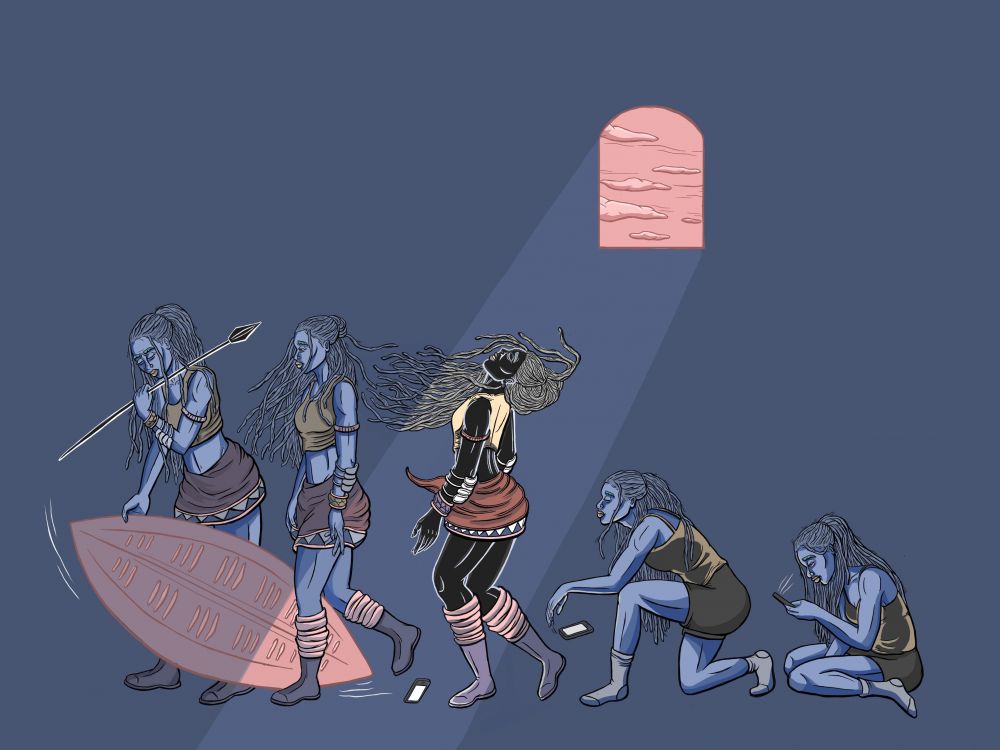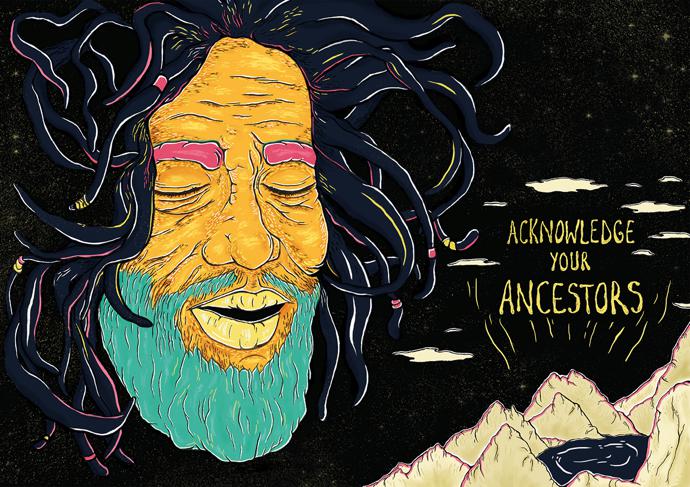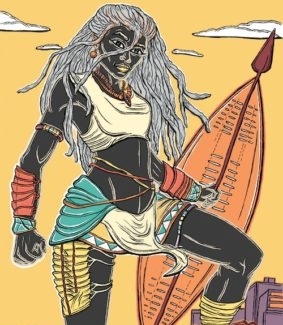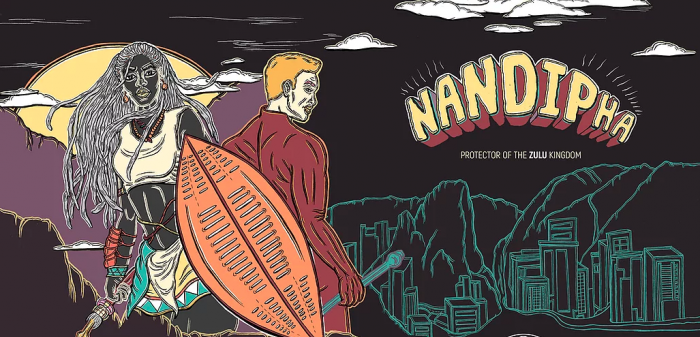New Heroes and Stories Retold: An Interview with Zhi Zulu by Lukanyo Mbanga
I grew up with many strong and empowering heroines in my life. Just none that looked like me. Most had blue eyes, rosy cheeks, straight hair, ivory skin or often all of the above. They saved lives, kicked ass, had rites of passage to divine worlds, and were in many ways the ‘chosen ones.’ You see, they didn’t just exist on screen or in storybooks. They existed in my mind too. Whether I was conscious of it or not, I settled with the fact that girls who look like me simply don’t get chosen.
It became difficult to even fathom a narrative where a brown skinned girl from an African country could have superpowers. That she’d be beautiful, live for purposes higher than what society deems on her. Until I first laid eyes Nandipha: Protector of the Zulu Kingdom. A girl by day. A warrior princess by night. Her shield on one hand and a spear on the other. Her locs dancing round her waist like the heroes we see in epics and legends. I was breath-taken. We all know that picture where a cat looks into the mirror and sees a lion? That was me…staring at my dream-self for longer than I did at any artwork in that gallery.
Questions began to spark. Who brought this life into being? What creative force could be so strong as to ignite such pride and admiration in my ethnicity and tribal heritage. Who could dispense years of Disney princesses with a girl shown in a single frame? Her name is Zinhle Zulu.

So, you’re an illustrator, a fine artist and an educator but ultimately, you define yourself as a storyteller? what exactly does being a storyteller mean to you?
I think it’s taking ownership of the messages that I try to tell. I try to respond to what I’ve written, or the concept by coming up with a sequence of art. But it’s always a challenge to try and transfer what is written to a form that’s unique. What’s more is that with so much diversity in our country, it’s a very rare occurrence that we have visual cultures and languages being appreciated. What we missed out in the whole rainbow nation journey was informing each other about our cultures. So, I think that’s when the whole storytelling thing started. The particulars of our cultures are very rich and diverse, but also there are similarities between those particulars that unite us. So, I think the narrative of my culture, concepts and stories—well, it’s absolute best part of my life and I want to express that.

How would you encapsulate the Zulu culture?
Initially I began to study the culture and philosophies of Africa. I tried to look at the origins and events, thinking: had we not been colonized where, individually culturally— just as a society as a whole—would we be? But that that whole idea of reaching back to pre-colonial times or trying to imagine a future without that influence is difficult to do without romanticizing it or making it seem like it was ideal. So I was trying to reach back and realized that a lot of the makings of my being have to do with many cultures. So the best thing that I could do is document what culture is to a lot of us now and set the parts of myself that aren’t necessarily pristine. I don’t think we would have been pure Xhosa or pure Zulu without any other cultural influence.
But I think what’s left of everything is our pride and our essence. Some of our rituals are there, and I think celebrating the importance of the connection between this realm and the spiritual realm is important for young people to explore. Documenting culture is about the now. It’s not necessarily about how it is relevant, but rather how do we make it relevant?
You mention the spiritual world which is a key element in your portrayal of Nandipha. Her adventures take place while she’s sleeping. Don’t you think this perpetuates the idea that a black female superhero only exists in dreams?
That is a valid interpretation. When I had started that concept, I used to wake up and write down my dreams almost every day. And I realized sometimes a supernatural kind of communication exists in states of unconsciousness and the unconscious state exists beyond seeing. So it influences our daily activities, whether we are aware of it or not. But the realms do end up merging and she becomes a hero in real life, but at-heart I wanted to draw on how, what happens in the realm of dreams and unconscious states inform what happens in the world around us.


How do you feel about Black Panther as a representation of African culture?
I mean, there’s a lot of controversy surrounding it. Wakanda is this hidden place that only its inhabitants have access to. It’s afro-futuristic and there’s good and bad to Afro- futurism because people often align technology to what the west brought. But we were actually all participants in the progress of technological advancements. So, a lot of the controversies around how can we be super African but super technological is bizarre to me. I think we do a lot of great things for a lot of people who want to see themselves be heroes. I think he could have had more powers though, haha.
The character Nandipha is inspired by your niece, but there’s room to appreciate the link between Queen Nandi Bhebhe, Shaka Zulu’s mother. Like her, Nandipha is the protector the Zulu kingdom. And so are you in a sense. You’re preserving the Zulu kingdom through visual storytelling. So as the years went on, as this character grew, did you see a lot of yourself in her? If so, in what ways?
I mean, I can’t help but place in her a little bit of myself and the black women I know, that I admire and that I’m family with. I sourced a lot from them to make a character that many people can relate with. She’s nerdy, an outsider in both her community (living in the hood) and going to a private school. Building her character, she started off being an aggressive young lady which is often considered a black stereotype and I didn’t want to perpetuate that. But there’s also a reason for that aggression that black women have. They have to take on a lot. And then they must suppress it. You could say that amplified feeling of being an outsider was a byproduct of this aggression. Essentially, we all have many parts to ourselves. So, the many parts of her may echo stereotypes but I try to break them down by pairing them with something that others can relate with. Something that’s real. It’s difficult to put together and I’m just letting the story unfold as the words get written and the drawings get drawn.
Often with the quintessential superhero-image there’s a sidekick shadowing them. Nandipha has a sidekick, that we rarely see. She’s often alone. Could it relate to the fact that journeys we take to the dream and spiritual worlds, are ones we take alone?
Absolutely. The sidekick actually isn’t alive. It’s a representation of a part of my own story. I had a best friend who passed away when I was eighteen. So that character is somebody that she only sees and meets in her dreams from time to time. But it brings about the idea that everybody has experienced loss. It’s the visual representation that your ancestors are with you, and even the people that you appear to have lost—they still walk with you.

You’re currently a lecturer and have been apart of many educative community projects. What are your teaching principles?
When I first started teaching, I felt very lost and out of place in the world. I was thinking and swimming at the same time. You also get a kind of imposter syndrome because you may have learnt a lot, but it doesn’t mean you have a handle on what you’ve learnt. But I learnt that you’re just taking somebody on a journey and guiding them. But it’s their journey, so you’re not more important than the student. This humbles you. It gives you the space to learn from them as well. I’m not a huge fan of this authority thing, especially with creatives because some people have aged miles beyond their years. I also ensure that I’m as honest as possible in terms of what they might face in the industry and trying my best to prepare them financially. I just want to make sure that my students are healthy and happy about the work that they create but also able to put food on the table.
I believe the real superheroes are the ones we see in our everyday life. They take the taxi, cover their heads in the rain, dance alone in their rooms and crave milkshakes. The closer we feel to them the more we resonate with them. Zhi Zulu has taken that to the next level by bringing to light the beauty of African culture and Zulu tradition. A sphere so glossed over by dominating spheres of influence. I found a hero in Nandipha but it didn’t stop there. Zhi Zulu is a hero in her own right. A creator of new worlds by bringing life to older ones. A storyteller and an artist of note.
See here for more info on Zhi Zulu
Written by Lukanyo Mbanga
